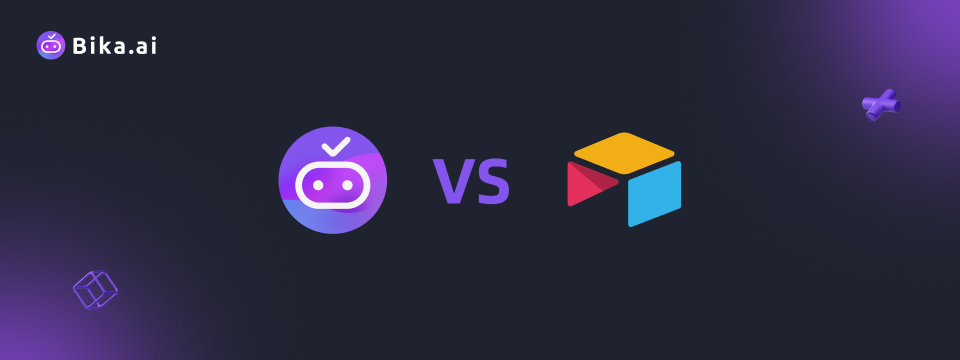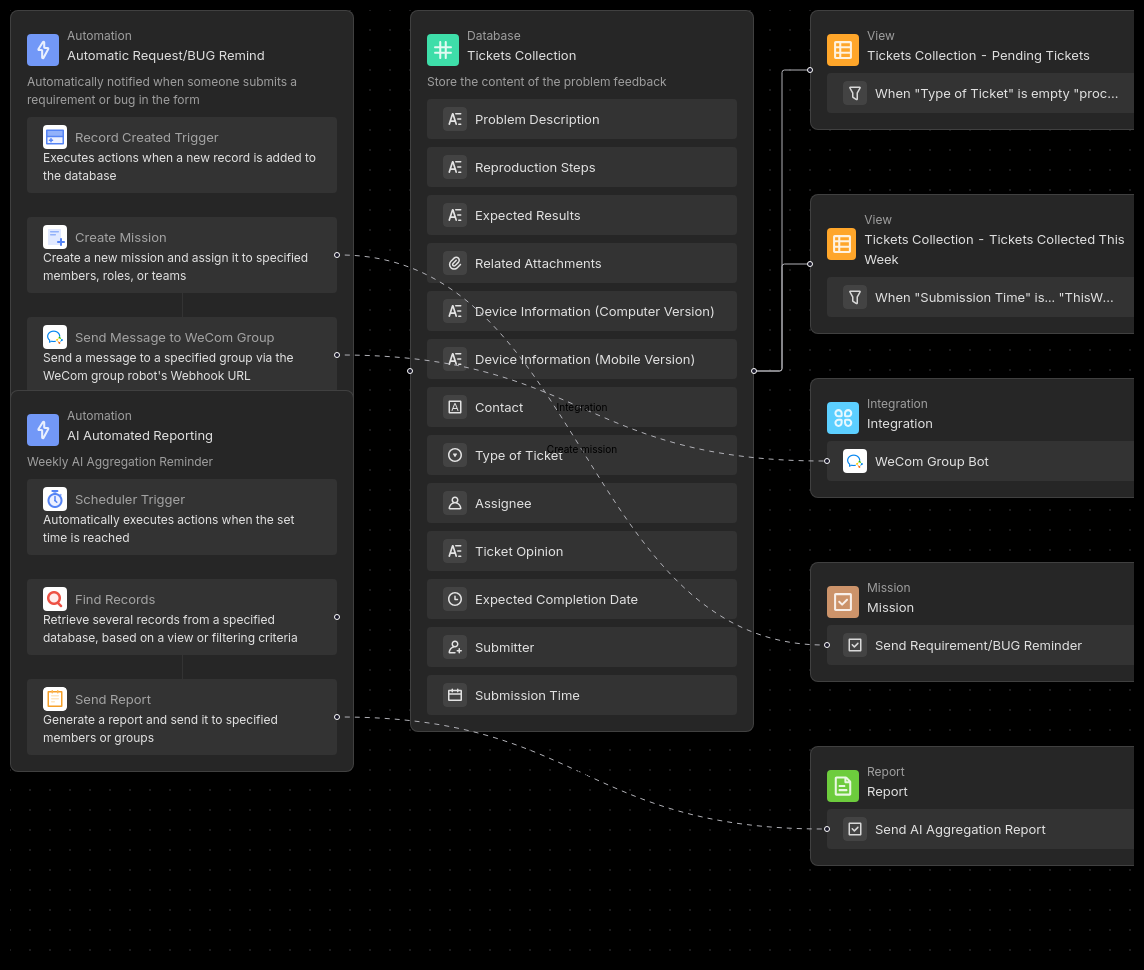
Airtable Pricing vs. Bika.ai Pricing: Which is More Advantageous for Business Analyst?
When choosing a tool for AI Project Issues and Tickets automation, what should Business Analysts consider?
When Business Analysts are on the hunt for a tool to build automated workflows for AI Project Issues and Tickets, they face a plethora of choices. Functionality often takes the forefront, but pricing should not be overlooked. Airtable is a popular option, but does its cost structure truly align with expectations? Enter Bika.ai. Let's compare the two on multiple fronts to make a more informed decision.

What are Airtable & Bika.ai?
Airtable is a cloud-based platform that combines the simplicity of a spreadsheet with the power of a database. It's designed for creating, sharing, and collaborating, allowing users to organize content, track projects, and manage tasks. However, it has its challenges. New users might find the base structure complex, and it has limitations when handling large datasets and offering easy-to-use automation.
Bika.ai, on the other hand, is an innovative no-code AI automation database. It offers a user-friendly interface with plug-and-play templates that make automating business processes a breeze. In the age of AI, it stands out with its ability to handle vast amounts of data effortlessly.
Airtable vs Bika.ai: Key Features At a Glance
Airtable is suitable for simpler tasks and smaller databases. Bika.ai, however, shines when it comes to handling complex tasks and larger data volumes. The key features comparison is as follows:
| Feature | Airtable | Bika.ai |
|---|---|---|
| Pricing | Free provided, paid plans from $20/user/month | Free provided, paid plans from $9.99/user/month |
| Platform Type | No-code database | No-code AI automation database |
| Ease of Use | Base structure is geeky for non-tech users | Directory tree is easy to use and user-friendly for general users |
| Records per Database | Up to 125,000 records per base for Business plan | Up to 1,500,000 records per database for Team plan |
| Automation | Basic automation capabilities with limited triggers and actions | Advanced automation capabilities with extensive triggers and actions |
| Template | Templates don’t include automation capability; no automation publish and share | plenty of plug-and-play AI automated templates with preset content; supports automation publish and share |
| Storage | 100 GB of attachments per base | 800 GB per space |
| API | Limited APIs | API-first platform making every feature an integration endpoint for automation |

Pricing Comparison of Airtable vs Bika.ai
Let's take a detailed look at the pricing plans of both Airtable and Bika.ai:
Airtable’s price plans
| Plan | Features | Price |
|---|---|---|
| Free plan | Unlimited bases 1,000 records per base Up to 5 editors 1 GB of attachments per base 100 automation runs Interface Designer | Free |
| Team plan | 50,000 records per base 25,000 automation runs 20 GB of attachments per base Standard sync integrations Extensions Gantt and timeline view Expanded color, formatting, and calendar options | $20 per user per month |
| Business plan | 125,000 records per base 100,000 automation runs 100 GB of attachments per base Premium sync integrations Verified data Two-way sync Admin panel SAML-based single sign-on | $45 per user per month |
| Enterprise plan | 500,000 records per base 500,000 automation runs 1,000 GB of attachments per base On-premises sync integrations Enterprise Hub Enhanced security and admin controls Enterprise API Extension and integration management Audit logs and DLP | Pricing on request (estimated to start at $70 up to $100 per user per month) |
Bika.ai’s price plans
| Plan | Features | Price |
|---|---|---|
| Free plan | 5GB of storage 10,000 records per database 200 automation runs Missions, Reports, AI Summary, and more Free Send Bulk 100+ SMS / 1000+ Email OpenAPI Access | Free |
| Plus plan | 50GB of storage 100,000 records per database 30,000 automation runs Permissions control More database fields, automation actions More free SMS, Email, Reports, Missions, AI | $9.99 per user per month |
| Pro plan | 200GB of storage 500,000 records per database 60,000 automation runs IM / Email Support Team / Organization Advanced OpenAPI and AI models | $19.99 per user per month |
| Team plan | 800GB of storage 1,500,000 records per database 100,000 automation runs Audit Logs Full integrations, automations Advanced Permissions | $39.99 per user per month |
It's clear that Bika.ai offers a more cost-effective solution for many teams without sacrificing essential features.

Why Choose Bika.ai Over Airtable for Business Analyst?
Business Analysts should consider Bika.ai for several compelling reasons. Firstly, its AI-driven workflow processing reduces the burden of manual tasks, saving precious time and effort. The ability to save and share automation capabilities enables rapid business development and boosts team efficiency. Handling large volumes of data is seamless in the AI era with Bika.ai. Moreover, the plug-and-play setup for automation simplifies the process and enhances productivity.
Specific examples include:
- Submitting bug reports: Bika.ai's intuitive interface makes it easy to document and track bugs accurately.
- Requesting new features: The streamlined process ensures that feature requests are captured and prioritized effectively.
- Tracking ticket status: Real-time updates keep everyone informed about the progress of each ticket.
- Assigning tickets: The system's intelligent assignment capabilities ensure the right tasks go to the right people.
- Sending progress updates: Automated notifications keep the team and stakeholders in the loop.
- Automated reminders: Prevents delays and ensures timely action on important tasks.
How to use Bika.ai's AI Project Issues and Tickets template?
Using Bika.ai's AI Project Issues and Tickets template is straightforward:
- Install the template into your Bika Space. You can install it multiple times if needed for multiple projects.
- Enter new feedback through the provided form. The submitted data is automatically recorded in the database.
- Configure the automation tasks by modifying trigger conditions and execution actions.
- Test the automation tasks to ensure they work as expected.
- Start the automation tasks and let them handle the project issues and tickets seamlessly.
This template is suitable for various roles such as Project Managers, Developers, QA Engineers, Product Owners, Customer Support, and Business Analysts.
Conclusion: Bika.ai's AI Project Issues and Tickets template offers a powerful solution for Business Analysts. By leveraging its features and functionality, teams can manage project issues, tickets, requirements, and bugs more efficiently, providing better outcomes and value. Try this automation template to overcome the challenges in your specific scenarios.

Recommend Reading
- Bika.ai vs Airtable: To develop promotional strategies
- Automated Stock Data Retrieval (Python): Airtable Alternative to Data visualization
- AI Data Automation with Bika.ai: Unlocking New Potential for AI Video Generation from Script in Reduce manual tasks
- Data Automation with Bika.ai: Unlocking New Potential for AI Video Generation from Script in Integrate with content tools
- Data Automation with Bika.ai: Unlocking New Potential for Weekly meeting reminder (Slack) in Code review reminder
Recommend AI Automation Templates



